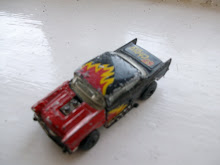In a sulking mood due to the results from last night alongside the impeding end of the football season, I feel I should write about something positive. It is Friday, after all, and perhaps it'll get me in the mood to finish an article for Noripcord.com this weekend. So I've decided to write a little of one of my favourite bands, the Beat.
That's the English Beat, for any American readers, my favourites of all the bands to emerge from the Two-Tone movement of the late 70s. A few years ago, it would have been the Specials everytime, but the last 12 months have seen me finally investigate the Beat's albums outside of a compilation album I picked up about ten years ago. It could be a result of me being a bit older and less enthralled with the sheer energy of the Specials album, but the Beat's cleaner edges and better lyrics have worked their way closer to my heart.
In 'Rip It Up and Start Again', Simon Reynolds almost dismisses the band as a 'politically correct' line-up (half black, half white) with two pretty boy singers backed by the 'pasty faced' Andy Cox (guitar) and David Steele (bass). True, Dave Wakeling and Rankin' Roger were attractive young men, but Wakeling was a top notch singer/writer and Roger was no mug either. Cox and Steele were also excellent musicians - Steele in particular linked up wonderfully with drummer Everett Morton.
What most do remember about the Beat was the presence of 'Saxa', a 50-something, pipe smoking Jamaican who'd played on records during the first wave of Ska. An incongruous sight next to a bunch of young lads from the Midlands, but his playing added refinement of the rough-and-ready early sound.
It was the early sounds, from their debut I Just Can't Stop It, that scored all their hits in the UK. It's one I listen to mostly when I need to fire myself up: the pace never really lets up except for the cover of Andy Williams' Can't Get Used To Losing You. My own favourite moments are the paranoia/naracassim of Mirror In The Bathroom and the nervous shuffle of Twist and Crawl (best lines: "Is that really blonde hair?/Why don't you play fair?/You could be in 'Mayfair'").
Reynolds described the follow-up album Wh'appen? as 'energy-sapped', a verdict way off the mark to these ears. With the two-tone sound yesterday's news, the band had to move on. That said, the singles All Out To Get You and Too Nice To Talk To (the latter on reissues only) could certainly get a dance floor moving. The best songs, such as the sublime Dream Home in New Zealand, tapped into the feeling of the times: tension and fear were high and their plea for 'unity' on Doors of Your Heart comes across as sincere and heartfelt.
Though their moment in the sun in their homeland seemed to have passed, America was taking notice and their third album Special Beat Service reflects this. It's full of pop arrangements, though not to any detriment of quality: testiomont to the skills of the players, now aided by keys player Dave Blockhead. It skips across styles with ease, from dramatic pop (I Confess), jangling guitars (Save It For Later) to reggae (Spa Wid Me) and calypso (Ackee 1-2-3).
While it received little notice at home, not even making the top 20, the album cracked the top 40 across the Atlantic. With huge US success apparently on the horizon, Wakeling did the sensible thing and quit during a tour with David Bowie. Along with Roger, he did make a commerical breakthrough in the States with their band General Public (alongside Specials bassist Horace Panter, Dexys Midnight Runners drummer Stoker and helped out by Mick Jones from the Clash) before running out of steam.
Cox and Steele, meanwhile, waiting for their moment before recruiting singer Roland Gift to create the Fine Young Cannibals. After a few decent-sized hits in the UK, they ended the decade as possibly the biggest band in the world as Good Thing and She Drives Me Crazy topped the Billboard Hot 100. Rather than work on a follow up, they decided not to bother. I kind of admire them for that.
Friday, 7 May 2010
Subscribe to:
Post Comments (Atom)

No comments:
Post a Comment